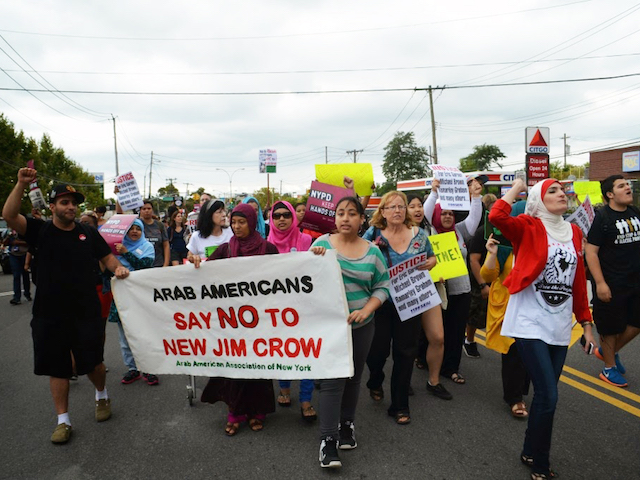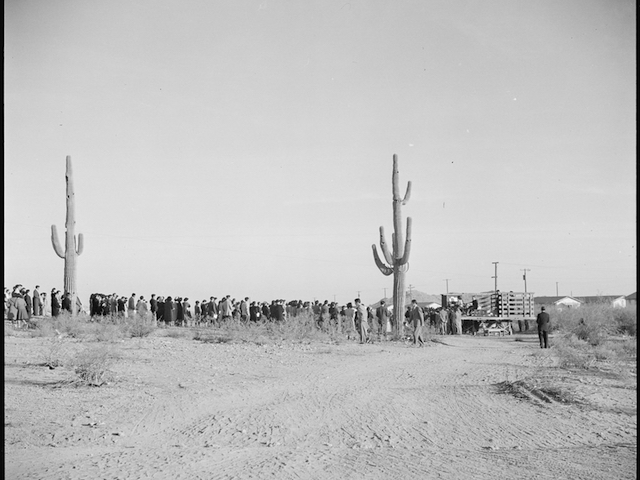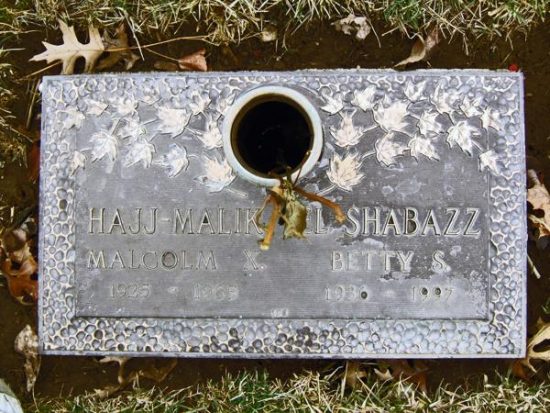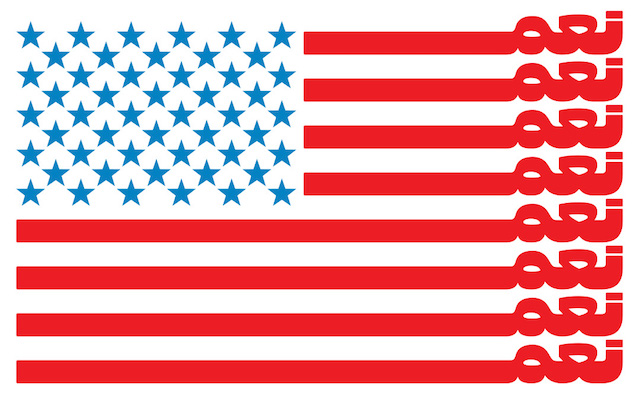Palestinian American community organizer Aber Kawas reflects on #IMarchWithLinda and putting the spotlight on those who are less visible

January 27, 2017
Immediately after last Saturday’s Women’s March, right-wing apparatchiks took to the Internet to smear one of the March’s organizers, the Palestinian American activist Linda Sarsour. The Islamophobic campaign accused her of being an anti-Semitic advocate for Sharia law—and found itself opposed by a wave of social justice advocates fighting back by tweeting why #IMarchWithLinda. Sarsour is the Executive Director of the Arab American Association of New York—and I found myself moved by the post below, originally published on Facebook, written by that nonprofit’s Youth Lead Organizer, Aber Kawas.
While left celebrities like Bernie Sanders and Naomi Klein tweeted their support of Sarsour, Aber’s essay calls for the spotlight to be put back on those who are less visible. In this sweeping, Whitmanesque call, Aber says she marches for her undocumented sisters, for drone attack survivors, for black Muslims, for the persecuted and entrapped, for the poor, for those who cannot speak in English, or cannot access reproductive rights. When I simply itemize these communities in this shorthand way, I do not capture the fullness of Aber’s invocation. Almost a prayer for solidarity, the piece illustrates how transnational feminism is not a winnowing down, but an expansive political vision—through which we need to face everything from anti-blackness to xenophobia, capitalism to imperialism.
We publish this post as Trump pushes through devastating Executive Orders militarizing the southern border, criminalizing immigrants, and restricting refugees and Muslim immigration. One cannot help but feel demoralized against the brutish violence of the state, but I ask you to remember Aber’s words: “I march because I don’t want this work to be forgotten and undone. Because we asked you to march yesterday, as a precursor for the many marches to come. So that when it comes down to the time where all of those I mentioned above are vilified and attacked—you are ready.” Because as you will know, when you read this piece: coalition is a genre of love.
—Ken Chen
The following is a post by Aber Kawas, Youth Lead Organizer for the Arab American Association of New York, originally written on Facebook and re-published here with her permission.
This past weekend has left me flooded with emotion. As our sister Linda Sarsour’s name trends in an international hashtag, after witnessing a weekend where she helped organize over one million people to stand for justice—I’m flooded with hope.
On the other hand, as I have seen this solidarity today and over the weekend, I’m also flooded with questions and concern—about what solidarity looks like, and if we are missing the message for the image.
Linda is someone who has stood by my side for years, supported me, mentored me, given me opportunities I can never pay back. She is both friend and family to me. #IMarchWithLinda because that’s easy to me—she’s close to my mind and heart at all times as we build movement. However, I know that the movement we are building together is asking for more.
As organizers who have the privilege of many platforms, whether they be communal, media, or literal platforms where we get to speak and address crowds of people, the point of our presence is not to bring the attention on ourselves, it is to bring attention to the ones we organize for.
I’m inspired by seeing this overwhelming support, but since we have your attention, I want to take this opportunity to challenge you all to extend that solidarity to those who are not visible. To those who are in fact erased and made to be invisible; many times unknowingly by us, who trend with what we see and do not stop to ask ourselves who is missing.
So let’s march:
I march with my undocumented sisters. With my sisters whose visas are being taken away. Who can’t reapply for DACA. Who can’t afford college tuition as dreamer’s dreams remain deferred. Who are entering into U.S. borders as immigrants, asylees, and refugees escaping horrific circumstances perpetuated by the foreign policy of the country whose borders they are trying to cross into.
I march with my sisters globally whose lives and livelihoods are being taken away by drones and bombs. Part of my solidarity is advocating against the unjust wars wreaking havoc on their lives, and the politicians pursuing those wars regardless of how wide their deceptive smiles may be.
I march with my Black sisters whose lives matter. Who unfortunately have to incessantly prove this to our communities despite their ancestries and legacies. Whose stories and images are erased. Even as they breathe under the mimbars of Imams that ignore their oppression in khutbahs. Even as they can’t breathe.
I march with my sisters imprisoned right now on false entrapment charges. The ones whose stories are too controversial to touch. The ones who Islamophobes call terrorists while we believe them and ask no questions. I march with my sisters who have been and will be persecuted for their political affiliations. I march with my sisters who are banned from entering into their homelands. With those who at a young age experience smear campaigns run against them on college campuses for refusing to compromise on their identities and beliefs.
I march with my sisters who don’t have access to proper health care. Whose reproductive rights are denied, and who have been criminalized for their poverty and the amount of children they bear. My sisters who for decades have been experimented on with sterilizing drugs. My sisters who are looked down upon for living on welfare and who despite all this are losing access to government assistance while others hold onto their wealth.
I march with my sisters who lack language access. Those who can’t speak and write in America’s English. Those who lack the words to defend themselves when they are harassed. Those whose accents we ignore because we feel too refined to acknowledge their tongues twisted with pain.
I march for my sisters and those that are pushed out of community for how they dress, act, choose to live/love—even when they hold community dearly in their broken hearts.
I march for so many more—those I forget, those whose stories even I look over when I’m too caught up in my own.
I march because I don’t want this work to be forgotten and undone. Because we asked you to march on Saturday as a precursor for the many marches to come. So that when it comes down to the time where all of those I mention above are vilified and attacked, you are ready.
Don’t forget them. Uplift them.
#IMarchWithLinda because she is my sister in Islam and despite all of our individual stories this Islamophobic/racist system is bigger than you and I. Because this is not new. This day has proven what we already know—that even if you are the co chair of the largest march in U.S. history with a million on your side, white supremacists, the right wing & Zionist lobbies will criminalize you and dehumanize you, regardless of who you are, how you look, and what you’ve done.
I march because we won’t win until we dismantle the systems of power that allow them to define our humanity.
Knowing Linda, I’m sure she appreciates the love and support (and YES she sure as hell needs a vacation) but she’d probably ask you to stay focused, step up, and march for them as well.
This is where the solidarity lies.



